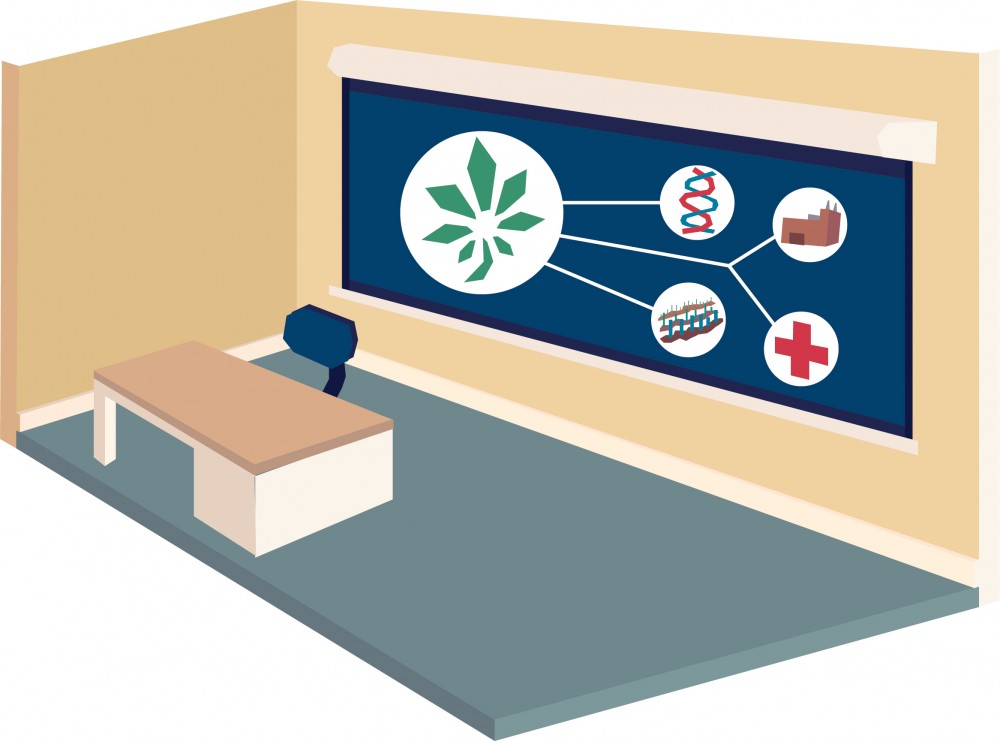A new class available at the University of Minnesota this fall aims to teach students about an often-controversial topic: cannabis.
An undergraduate course in the Department of Agronomy and Plant Genetics, the class covers issues around cannabis such as its biological makeup, uses and impact on society and regulations at the state and federal level.
The course was finally approved in July after about a month and a half of going through the approval process. Mary Brakke, an assistant professor co-teaching the course, said it took longer to be approved than courses she has proposed in the past because of additional reviews needed from the University.
The idea for the class, titled “The Science of Cannabis,” came about because of students interested in learning more about the cannabis industry. Over the past four or five years, there has been a growing number of students showing an interest in working in the field, Brakke said.
“We are hoping to give students an opportunity to explore areas of interest in a place where they can get informed feedback from us, other students and people who work in related fields,” Brakke said.
The class will dive into how science drives public policy, something assistant professor Peter Morrell, who is also co-teaching the course, said has been a challenge with the cannabis industry because of the lack of research in the area.
“This is a neat chance for students to learn about science, public policy and societal change all within a single vein,” Morrell said.
As state laws around cannabis change and the industry continues to grow, Brakke said there are a growing number of employment opportunities in cannabis research, cultivation and production.
Concern over the legal implications of offering a course about a controversial drug prompted the course to go through a more intense review process than most University classes. Throughout the course approval process over the summer, there was concern from faculty over the implications if it appeared the University was teaching students how to grow cannabis.
Cannabis is classified as a Schedule I drug by the federal Drug Enforcement Administration. Schedule I drugs, which also include heroin and LSD, are considered to have no medical value and have a high potential for abuse.
However, states can create their own laws around cannabis and often have looser regulations around the drug. In Minnesota, cannabis is legal for medicinal purposes only. The District of Columbia and 11 states have legalized the recreational use of cannabis.
Due to concern over a potential loss of federal research funding because of the legality of the drug, the course was sent to lawyers in the University’s Office of the General Counsel for further review before it was approved.
A course about something controversial, like cannabis, cannot be rejected because some faculty may oppose the topic, said Michael White, an associate dean for academic programs and faculty affairs in the College of Food, Agricultural and Natural Resource Sciences. He said this course had to go through additional barriers because of the laws surrounding cannabis.
Several changes were made to the course following the review by the Office of the General Counsel to make sure the course properly navigated federal restrictions around the drug, Morrell said. The biggest concern was making sure that the course was not teaching students how to grow cannabis, he said.
Some employment opportunities in the industry in Minnesota revolve around hemp, a part of the cannabis plant used to make products such as rope, certain fabrics and paper. Growing hemp is legal in the United States.
Part of the education surrounding hemp production is ensuring THC levels are low enough in the plant to avoid crossing over into territory that is federally illegal, Morrell said. THC is the component in cannabis responsible for getting the consumer high.
A challenge to offering a course on cannabis at the University is that it is hard to find faculty who are experts in the area, Morrell said. Federal regulations around the drug make it difficult for University faculty to conduct research related to cannabis.
“As a result, there are not many people in a position to offer a course like this,” Brakke said. Brakke and Morrell have invited experts in the industry to visit the class throughout the semester and provide insight on the topic.
Morrell said he is excited about the positive feedback the class has received and has not had this many students reach out to him about taking a class before.
“Part of our goal is to offer courses students are interested in being a part of. It is fun having students engaged and excited about coursework.”
















